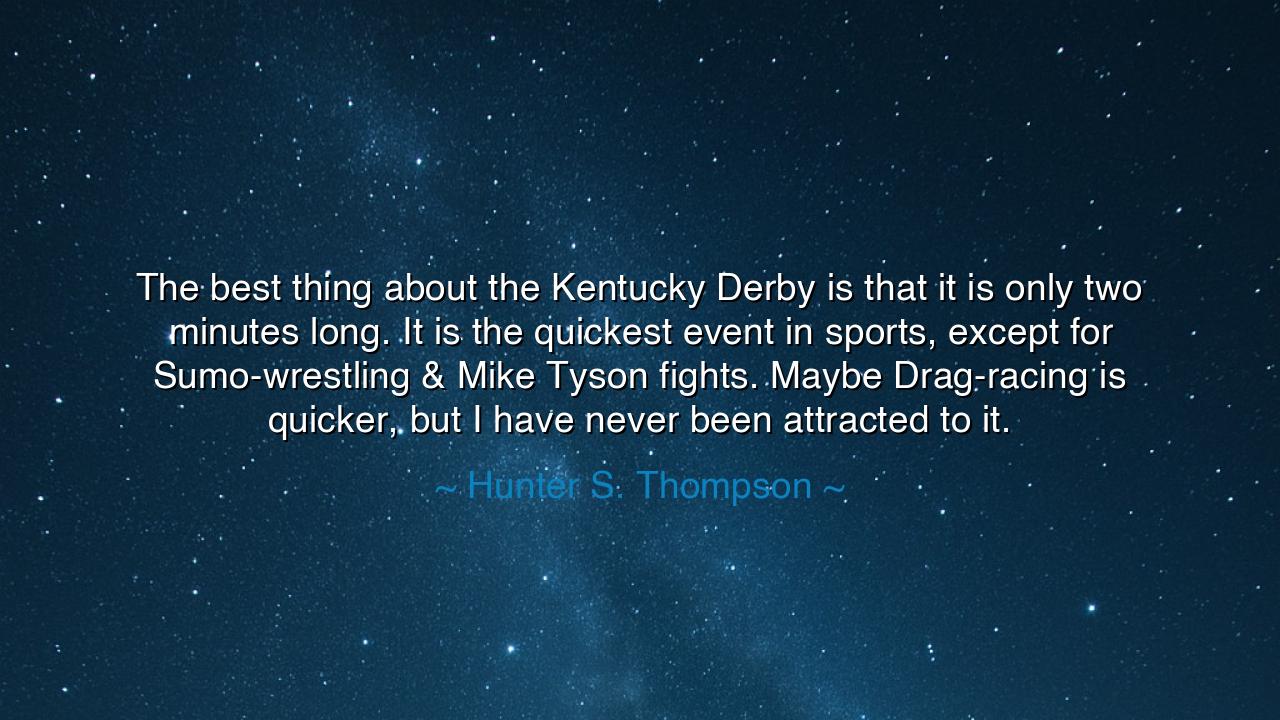
The best thing about the Kentucky Derby is that it is only two
The best thing about the Kentucky Derby is that it is only two minutes long. It is the quickest event in sports, except for Sumo-wrestling & Mike Tyson fights. Maybe Drag-racing is quicker, but I have never been attracted to it.






The writer and provocateur Hunter S. Thompson once quipped: “The best thing about the Kentucky Derby is that it is only two minutes long. It is the quickest event in sports, except for Sumo-wrestling & Mike Tyson fights. Maybe Drag-racing is quicker, but I have never been attracted to it.” Though delivered with his signature humor and irreverence, these words reveal a deeper reflection on the nature of sports, spectacle, and human attention. In brevity, Thompson saw intensity; in speed, he saw the distilled drama of life itself, where all effort and anticipation come to a climax in a fleeting moment.
This quote reminds us that not all greatness is measured by duration. The Kentucky Derby, brief as it is, contains within its two minutes the culmination of months of preparation, the sweat of trainers, and the power of the horses. Every stride is charged with energy, every second pregnant with consequence. Thompson compares it to Sumo-wrestling and Mike Tyson fights, where the most monumental exertions can also collapse into astonishingly brief windows of outcome. Here lies an ancient truth: the magnitude of an event is often felt not in its length, but in its intensity.
History offers many parallels. Consider the Battle of Thermopylae, where three days of preparation and strategy culminated in a single, decisive engagement. Though brief, the impact was eternal, immortalized in story and song. Similarly, Thompson’s admiration for the fleeting moments of sport reflects the idea that in life, as in competition, the moment of truth—the instant where preparation meets action—is what endures in memory. The Derby may last two minutes, but those minutes echo for decades in the hearts of participants and spectators.
Thompson’s playful exclusion of drag racing reveals another subtle insight: fascination is shaped by personal resonance. He admired contests where skill, tension, and character converge, rather than mere raw velocity. This distinction mirrors the ancients’ distinctions between contests of skill and contests of chance, where admiration was reserved not for spectacle alone but for the human spirit revealed under pressure. In Thompson’s mind, speed alone was insufficient; meaning arose from drama, struggle, and consequence.
The meaning of his words also underscores the value of anticipation and preparation. Two minutes of racing demand months of conditioning, strategy, and care. Just as in life, the most intense, meaningful experiences often seem brief, but are the fruit of unseen labor. The audience feels the thrill because it is earned; the spectacle is potent because it compresses effort, skill, and chance into a moment that leaves memory echoing long after the event ends.
The lesson to carry from Thompson’s reflection is that life’s fleeting moments can be the most profound. Do not undervalue brevity. Prepare, practice, and dedicate yourself fully, so that when the crucial instant arrives—whether in sport, work, or relationships—you can pour all of your energy into it. Life, like the Derby, is measured not by length but by the intensity and focus you bring to its decisive moments.
Thus, Hunter S. Thompson’s quote endures as both humor and wisdom. It teaches that brevity can magnify meaning, that preparation and focus render short events eternal, and that the human spirit shines brightest when compressed into moments of crisis and triumph. Let us approach our own lives as we would the Derby: with energy, anticipation, and courage, knowing that though the moments may be brief, the echo of our efforts can last a lifetime.






AAdministratorAdministrator
Welcome, honored guests. Please leave a comment, we will respond soon